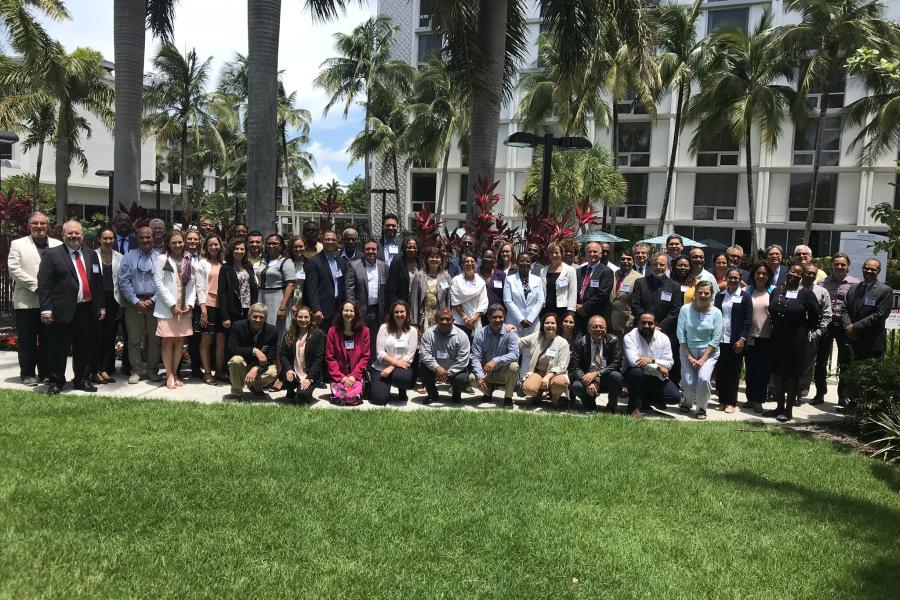The Western Central Atlantic Fishery Commission (WECAFC) member countries take ownership of its reform and make important decisions to bolster regional fisheries management
31 July 2019
- The recently held WECAFC’s 17th Session in Miami, USA from July 15-18 2019 achieved a major breakthrough in the transformation of the Commission along with members endorsing prominent instruments and making recommendations to further the regional governance of fisheries.

The deliberations on the strategic re-orientation proved successful with the major step made by member countries to take ownership of the process to define and establish without outside influence on what are the best alternatives for the Commission to achieve the sustainable management of their shared living marine resources for the socio-economic benefits of all, from fishing communities to consumers. In this disruptive member-driven and inclusive (with fisher-folks) process they provided a clear roadmap to the WECAFC Secretariat, and agreed on an Ad Hoc Intersessional Working Group for progressing towards the development of a model for a regional fisheries management entity or arrangement in the WECAFC area.
The meeting was attended by seventy high-profiled delegates from 25 member countries and 20 partner organizations. The Honorable Athil D. Jonas, Minister of Agriculture, Lands, Fisheries and Barbuda Affairs, who attended the meeting stated, “the meetings were well organized and featured a number of topics which were relevant to the state of fisheries and aquaculture in small island developing states such as Antigua and Barbuda”.
In praising WECAFC, Minister Jonas indicated, “I also commended WECAFC for the hard work invested in developing a robust database and statistics information system that will go a long way towards benefiting the region and informing decision makers such as myself. Antigua and Barbuda is committed to the continued support for the work in this very important sector, which has major implications for the state of our economic and food security”.
Meanwhile, Mr Gilbert Andre Kong, Director of Fisheries in Jamaica indicated that, “Jamaica is very satisfied with every aspect of the 17th WECAFC Meeting, including the organization and the Chairmanship. Jamaica is especially appreciative of the deliberations on the reform of the Commission, that featured the understanding and collaborative disposition of Members and ultimately led to acceptable conclusions and agreement for critical follow-up action”.
Among the critical challenges facing the region which was tabled to be addressed in a cohesive manner is the Illegal, Unreported and Unregulated (IUU) fishing, known for its dire implications for millions of persons’ livelihoods and adverse impact on national economies, food security, and the environment and on labour standards. The WECAFC’s 17th Session endorsed a 10-year Regional Plan of Action with 28 measures and actions to combat IUU fishing through effective regional cooperation among its 34 Member States and other sub-regional organizations to boost healthy marine environment, the economic development and the social wellbeing of coastal communities. It further underscores the importance of harmonizing policies, encouraging information sharing, identifying capacity development needs, and better facilitating the implementation of international instruments and tools to prevent, deter and eliminate IUU fishing through effective regional and international collaboration as already foreseen in the Caribbean Community Common Fisheries Policy (CCCFP).
The WECAFC members also responded positively to the Interim Data Collection and Reference Framework (DCRF) which is aimed at providing decision-makers with sufficient and reliable information on data and statistics to develop effective fisheries policies together with other tools that establish the foundation for collection, collation, and submission of comprehensive fisheries data and statistics in the WECAFC area.
Ms Elizabeth Mohammed, Senior Fisheries Officer in Trinidad and Tobago, did not hesitate to voice her satisfaction in the using of the DCRF tool. She expressed, “this system will revolutionize the way we analyze and report fisheries statistics – improving the efficiency and accuracy in reporting, but also expanding the range of data types and facilitating the respective linkages to enrich the information available for fisheries management decision-making and national planning and development for the sector”. She also added that, “the display and graphical features are remarkable in that they allow to overlay the range of information on a map for publication and presentation purposes, providing a more holistic picture of what is happening on the ground”.
During the WECAFC 17th Session, other significant decisions were made to reinforce the management of selected commercial species, such as queen conch, spiny lobster and shrimps and ground fish. The adoption of updated Caribbean Spiny Lobster Fishery Regional Management Plan (MARPLESCA plan), was also one of the noticeable achievements of the meeting.
Mr Edward Jackson Abella, Instituto Nicaraguense de Pesca y Acuicultura (INPESCA), Nicaragua and member of the Council of Ministry and of the Executive Committee of Organización del Sector Pesquero y Acuícola del Istmo Centro Americano (SICA/OSPESCA) reaffirmed the importance of this action by the Commission. He stated that, “this instrument overwhelmingly endorsed by WECAFC members, establishes a systematic process for the lobster fishery in the Caribbean region in a sustainable way, promoting the ecological balance that allows to achieve social and economic benefits of the interested parties. OSPESCA will play its part for the successful implementation of this plan”.







